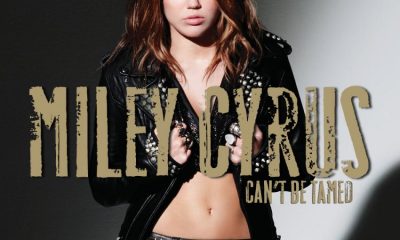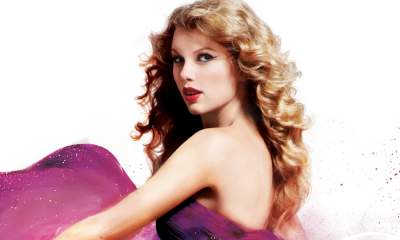Album Reviews
Album Review: Taylor Swift – Fearless

Taylor Swift’s much anticipated sophomore album finds her at a point of transition, on the brink of two very different and conflicting musical directions—one of which builds on the foundation of her enormously successful self-titled debut, while the other dismisses that foundation entirely. Fearless is a bipolar album that dips its feet into both pools, Swift seemingly caught between the girl she was and the woman she’s becoming, unsure of which path to embrace musically.
There are moments of brilliance on Fearless, moments when Swift’s oft-cited “potential” takes a big step forward towards realization; in the midst of that process she tangibly surpasses most of her peers in terms of artistic achievement, moving beyond simple mastery of craft to tap into a well of emotional sincerity. And there are moments when her songwriting appears to take a step backward, when it feels artificial and forced, when it seems unfocused and preoccupied with its own image.
Taylor Swift suggested that its namesake had a unique talent for narrative structure and a true gift for building living characters—characters who seem real and who remind us of ourselves. There are a number of songs on Fearless which not only confirm that suggestion, but which show real growth and maturity as a songwriter—where Taylor Swift often struggled to get past the surface of its character’s emotions and conflicts, Fearless, at its high points, is piercingly honest and surprisingly bittersweet. In the highly affecting “Fifteen,” Swift takes on the role of advice-giver as she waxes on the difficulties and experiences of high school, like an older sister who recognizes the mistakes she’s made.
Likewise, the album’s pinnacle track “White Horse” moves past the superfluous anger and knee-jerk spitefulness at the root of songs like “Picture to Burn” and “Should’ve Said No” to get to a deeper, more personal post-breakup place. On “White Horse” (co-penned by Liz Rose) Swift opens her broken heart and fully comes into her own as a songwriter on a song that anyone would be proud to have written.
Where Fearless fails, however, is when it rejects that artistic growth and instead embraces an idyllic world that revolves around first kisses and homecoming dances. On “White Horse,” Swift declares, “I’m not a princess/This ain’t a fairytale,” but on the album’s first single, “Love Story,” she more or less implies that love is, in fact, a fairytale.
And that’s the point at which Fearless, aside from developing two confusing images of Swift, disregards its predecessor–Taylor Swift may have been somewhat immature and, to a point, naive, but it was nonetheless a collection of organic compositions which sprouted from Swift’s own experiences and observations. Too often Fearless feels like an album that is supposed to be about young love instead of just being about that love. When that happens, the music becomes abstract and the characters lose their fullness.
So too is this true musically; on the album’s best material Swift shows off a newfound sense of restraint and significantly improved singing. “Forever & Always” and “Hey Stephen” both showcase a previously untapped brightness, but when the music shifts to bubbly or aggressive her voice is easily washed out, far too small for the blistering production that accompanies the majority of the album’s up-tempos; the unbearably overproduced “Change” is by far the prime example of this.
It’s worth noting that most of the discussion surrounding Fearless will no doubt focus on the content of the material, and rightly it should. It is a mistake, however, to assume that because Swift is writing songs about the adolescent experience that those songs have less artistic merit or emotional complexity than songs about so-called adult situations. Here Swift fearlessly deals with issues that affect teens on a daily basis—issues that many adults would rather simply ignore. At its core, this is an album that explores the balance between romance and sexual desire at a time in life when both are new and mysterious. Swift handles those issues sensitively and aptly, and that is something that few writers—teen or adult—can claim.
Still, there are times here when her gift for storytelling seemingly gets caught up in the world it’s exploring, too insular to be nuanced, too stuck in the moment to see a bigger emotional picture. And there are, of course, times when that’s not the case at all–when Swift proves, yet again, that she truly is something special.
Swift’s songwriting is most effective when she’s being honest with herself and her audience. On Fearless, there is one half of Taylor Swift that hints at Emmylou Harris and there is one half that hints at some other, her unnamed country sweetheart.
Let’s hope she settles on the right direction.
- Lists13 years ago
Top 10 Country Music Albums of 2010

 Interviews5 years ago
Interviews5 years agoJohn Rich – The Interview

 Song Reviews16 years ago
Song Reviews16 years agoTaylor Swift – “Love Story”

 Interviews5 years ago
Interviews5 years agoHoneyhoney on Hiatus: Revisit our 2008 Interview with Suzanne Santo

 Album Reviews14 years ago
Album Reviews14 years agoAlbum Review: Miley Cyrus – Can’t Be Tamed

 Song Reviews6 years ago
Song Reviews6 years agoThe Band Perry – “Hip To My Heart”

 Columns5 years ago
Columns5 years agoThe Link Between Folk Music’s Past and Present

 Columns5 years ago
Columns5 years agoIs Marketing Killing Rock and Roll?



